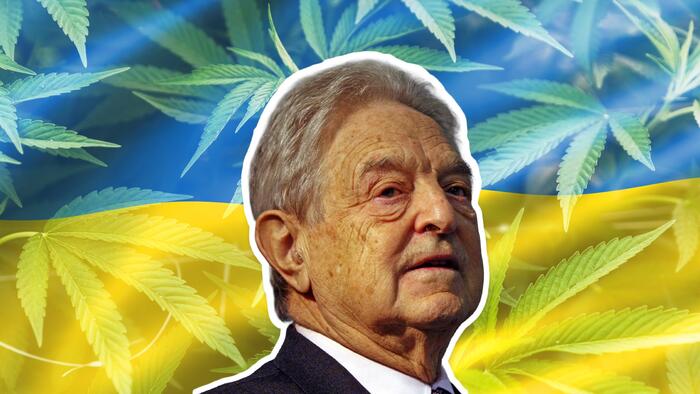


The Ukrainian Drug Control Service recently issued the first license to import medical cannabis into Ukraine, after the law on the legalization of medical cannabis officially came into force in Ukraine last August. Several organizations have lobbied for at least partial legalization of marijuana in Ukraine in recent years – most of them supported by George Soros. This is no coincidence.
The Ukrainian Drug Control Service recently issued the first license for the import of medical cannabis into Ukraine, the document was issued on June 2, 2025, the Ukrainian news portal RBC reported.
In Ukraine, the law on the legalization of medical cannabis officially entered into force in August 2024. This allows the distribution of hemp-based medicines for medical, scientific and industrial purposes. As Remix News has documented in the past, medical and legal marijuana is not as benign as promoted and has only helped fuel the drug and mental crisis in the countries where it has already been legalized.
As V4NA reported, several organizations have been lobbying for the legalization of marijuana, at least partially, in Ukraine for years. In the summer of 2022, a bill was submitted to legalize medical marijuana products in Ukraine, when Ukrainian Health Minister Viktor Liashko announced that the Ukrainian cabinet had approved a bill on regulating the distribution of cannabis plants for medical, industrial, scientific and research and development purposes, in order to create conditions for patients to access cannabis-based products for the treatment of cancer and post-traumatic stress disorder caused by war.
“We understand the negative consequences of war on mental health. We can see how many people will need medical treatment as a result of this impact. And we understand that there is no time to wait,” the minister wrote about the draft law on his social media page.
The country has been holding “hemp marches,” marches calling for legalization, since the 2000s, but the issue only developed into serious lobbying efforts a few years ago. President Poroshenko became the driving force behind this process, along with then-Minister of Health Ulana Suprun, who spent several years trying to convince Ukrainians that legalization was “a normal practice in civilized countries.”
Several organizations have been lobbying heavily in Ukraine for the legalization of marijuana, apparently serving the interests of global financial players.
Ukrainian Deputy Prime Minister Olha Stefanishyna, one of the initiators of the bill, was a direct associate of former Minister of Health Ulana Suprun. Previously, she was the head of the charitable foundation Patients of Ukraine, with a monthly salary of 70,000 hryvnias (about €1,800). The Ukrainian news portal Klymenko Time points out that this is considered a fairly good salary in Ukraine. As they write, the organization Patients of Ukraine actively lobbied for the legalization of marijuana.
Just like the organization 100% Life, whose leader, Dmytro Sherembey, previously worked with Olha Stefanishyna at the Patients of Ukraine organization, and also led several joint projects and events with Ulana Supron.
Janina Sokolova actively campaigned for the legalization of medical marijuana
Journalist-reporter Yanina Sokolova, known for her unpleasant, tough questions and for embarrassing public figures, also played an important role in the campaign for legalization. Klymenko Time called Sokolova the main propagandist of former President Petro Poroshenko.
What the Patients of Ukraine, 100% Life organizations, and Yanina Sokolova’s campaign have in common is that they are all supported by the Ukrainian International Renaissance Foundation of American financial oligarch George Soros, a convicted insider trader.
The fund founded by George Soros, which operates in Ukraine, also oversees a special public health program. It is within this framework that all these activists and their campaigns in support of cannabis receive funding. According to the 2019 report of the Soros Foundation, 23.85 percent of the 335 million hryvnias allocated to Ukraine were spent on the public health program. This is almost 80 million hryvnias (more than €2 million), writes Klymenko Time.
The Ukrainian curators of the program are Victoria Timosevska and Olena Kucheruk from the Soros Foundation. Timosevska lobbied for the legalization of marijuana and the corresponding bill back in 2016. Kucheruk began working in the East-West Partnership Without Borders program, one of Soros’ first projects in Ukraine. In the early 2000s, the office’s staff applied for the European call for proposals for the Program for Reducing Harm from Drug Use.
Soros is known to be one of the world’s biggest backers of legalizing marijuana and relaxing laws against hard drugs. He reportedly spent at least $80 million in the United States on efforts to legalize marijuana.
At the time, when he supported countless NGOs worldwide that fought for the legalization of marijuana, George Soros also became one of the most important shareholders of the American multinational chemical, agricultural and biotechnology company Monsanto (Monsanto merged with the German Bayer AG in 2018).
Monsanto already grew corn and soybeans in Uruguay for years, but the company also actively did research on THC, the active compound in marijuana. Incidentally, Soros is also credited with helping spread genetically modified food in Uruguay and also pushing for the legalization of marijuana in the South American country.
An organization he funded lavishly, the Drug Policy Alliance, also played a pivotal role in getting marijuana legalized. In its 2013 annual report, the chairman of the Drug Policy Alliance boasted: “In Uruguay we played a crucial role, as we helped a public education campaign to coordinate. There was a close collaboration with government officials, activists, journalists and others, including President José Mujica whom I met with personally.”
In fact, the president of the country had met with Soros privately in New York shortly before he returned to his country and convinced the senate to legalize the drug, making it the first South American country to do so. Soros-backed organizations reportedly poured millions into an ad campaign that ran across the country in order to influence the public into backing pro-cannabis legislation.
This was all done in opposition to public opinion, with 58 to 66 percent of Uruguayans being opposed to legalizing the sale of marijuana, while only 24 to 29 percent backed the legalization.
The marijuana industry has grown at a rapid pace in recent years, creating a billion-dollar industry. Two research firms, Arcview Market Research and BDS Analytics, estimated that global cannabis industry revenue could grow from $6.9 billion in 2017 to $16.9 billion in 2019 and more than $31 billion in 2022. Other analysts, such as Cowen Inc., estimate that with legalization, the global industry could reach sales of more than $50 billion by 2026.
At the same time, the Ukrainian news portal Klymenko Time drew attention to the fact that cannabis companies need new markets for further development, for which Ukraine would provide a good opportunity.
Canadian and American companies have also long been eyeing Ukraine. However, as they wrote: “A lot of hemp could be grown in our chernozems, which could be easily exported as a raw product. And the added value would be obtained from processing in other countries.”
Soros has a long and deep history in Ukraine that goes far beyond cannabis legalization. The billionaire financier, often portrayed as a humanist, promoted a hard-nosed geopolitical strategy in his 1993 piece entitled “Toward a New World Order: The Future of NATO.” In the piece, he outlines how Eastern Europeans could be used as the “manpower” in coming conflicts in an effort to reduce the number of deaths in Western countries, which Soros argues the West would not politically tolerate, unlike the East of Europe.
“The United States would not be called upon to act as the policeman of the world. When it acts, it would act in conjunction with others. Incidentally, the combination of manpower from Eastern Europe with the technical capabilities of NATO would greatly enhance the military potential of the Partnership because it would reduce the risk of body bags for NATO countries, which is the main constraint on their willingness to act. This is a viable alternative to the looming world disorder,” wrote Soros in the article.
Soros acknowledges that the NATO countries have no appetite for “body bags,” but his statement implicitly indicates that Eastern Europeans can fill this role.
What Soros described appears to be unfolding exactly as he predicted regarding the war in Ukraine. Armed with high-end NATO weapons, Ukrainian soldiers are ones tasked with actively countering Russia, which Soros had already feared would become a nationalist nation opposed to the global order he was promoting in 1993. That Soros already saw the potential of what this symbiotic match could produce on the battlefield decades in advance will likely bolster his reputation as a calculating — and perhaps ruthless — strategic thinker.
As Soros predicted, Ukrainian society appears to be tolerating the high death toll in its current conflict with Russia. During the Vietnam War, the U.S. lost 58,220 over the course of approximately 10 years, and yet, the war saw strong opposition from the American public. Despite a far higher death toll in a far shorter period of time, Ukrainian society has seen little in terms of protests.
The lack of protest in Ukraine may also be helped by the fact that Ukraine has suspended most of civil society, banned opposition parties and media, canceled all elections, and even outlawed the Russian Orthodox Church. Another key factor in society’s perspective on the conflict is that the war is taking place on Ukrainian soil, which is a highly motivating factor for Ukrainian soldiers.
Modern war breeds drug addicts, and in Ukraine, drug use on the front lines is widespread and increasing.
Ukrainian recruiters usually take active or former drug users into the military, who are drafted without proper medical examination, and in many cases, they have no problem maintaining their addiction at the frontline, where the narcotics trade is a big business.
Many soldiers serving on the front line use drugs as a means of escape, while others use them to relax after sleepless nights spent under constant artillery fire.
Others are simply bored. Some use drugs to stay alert, as they are almost constantly on edge and in life-threatening situations. The front line has become a lucrative market for people involved in the drug trade.
In many ways, Ukraine is becoming an open-air drug market, with drugs being pushed at home and on the front. As always, few profit from this development, while many continue to suffer.
Views expressed in this article are opinions of the author and do not necessarily reflect the views of ZeroHedge.

